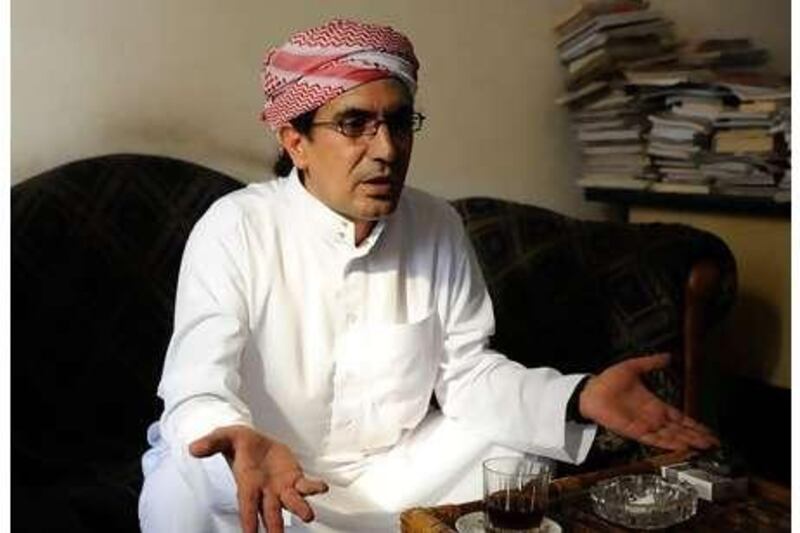CAIRO // To the Bedouin writer and blogger Mosaad Abu Fajr, the Sinai means everything. The arid peninsula covering 60,000 sq km is the place where he was born. His six-year-old daughter, Ranad, was named after a tree. Most notably, perhaps, it is the reason why he has spent most of the past three years in jail - imprisoned, he says, for calling the public's attention to the grievances of the Bedouins who live there and for demanding their rights.
Abu Fajr, 44, was arrested on December 2007, accused of possessing leaflets that promote incitement, although no charges were ever brought against him. Courts ordered his release 21 times, but authorities overturned each decree and kept him in jail under Egypt's 30-year-old state of emergency, which allows any Egyptian to be held indefinitely without trial. He was finally released last week, still unbowed and determined.
"My arrest is one of the regime's gravest idiocies, I didn't expect them to be that stupid," said Abu Fajr, referring to the government of the president Hosni Mubarak. "They accuse me of inciting violence through my writings, [but] I will continue to do so [write], as my writings reflect my experience. Now they have handed me the prison experience, preventing me from seeing the sun and locking me up with criminals, murderers and drug dealers."
Although deprived of his freedom of movement during his detention, Abu Fajr insisted that he retained something far more important. "I believe that one's freedom is inside him, and nobody can take that away," he said. "As a Bedouin, I'm the son of freedom, which is the enemy of the regime." Abu Fajr first came to prominence in early 2007 with the publication of his novel, Tale't Badan, which is a name of a mountain in Sinai. Like his blog, Wedna N'eesh, or We Want to Live, the book described the mistreatment of the Bedouins living in Sinai. Nael al Toukhy, a reviewer, called reading it a "shocking feeling".
"As you read the history of other people who are economically, politically and geographically ostracised, they are the Bedouins of the Egyptian Rafah, where Mosaad Abu Fajr belongs," Mr al Toukhy wrote. The indictments of the Egyptian government laid out in Tale't Badan, along with his blog, are believed to be the reasons that authorities later detained Abu Fajr. Earlier this week, in an interview in the Egyptian capital, the chain-smoker Abu Fajr, dressed in traditional white robes and a red-checkered kaffiyeh, traced the problems of Bedouins in Sinai to April 25, 1982, the day Sinai was liberated from Israeli occupation.
"I waited for liberation till that day, but when it came I discovered it wasn't liberation, as dictatorship is worse than occupation," he said. Although he was quick to add that he is no apologist for occupation, he said that "Sinai has been neglected by the government, is suffering from dire poverty, unemployment, and Bedouins are treated like traitors with harsh security crackdowns". Since then, there have been frequent clashes between police and Bedouin protesters. Their demonstrations near Egypt's border with Israel have been seen as deeply embarrassing to the government. Armed groups of Bedouins led by Salem Lafy havethreatened to target infrastructure if the government keeps raiding Bedouin homes and villages in the Sinai.
In response to the increasing political activism among Bedouins, the government has released some detained Bedouins and promised economic opportunities to leaders in order to secure their allegiance while they hunt tribesmen involved in smuggling and human-trafficking. Abu Fajr may have been a beneficiary of the government's initiative, for he condemns the use of violence by Bedouins to gain redress for their grievances.
"I'm not going to fight the Egyptian state, not out of fear - Bedouins are armed and can use force. But I'm against the use of force from both the government and from the people," he said. "The rights I demand for my people in Sinai are recognised by humanity and internationally, I will struggle peacefully to achieve freedom, justice and progress". @Email:nmagd@thenational.ae





